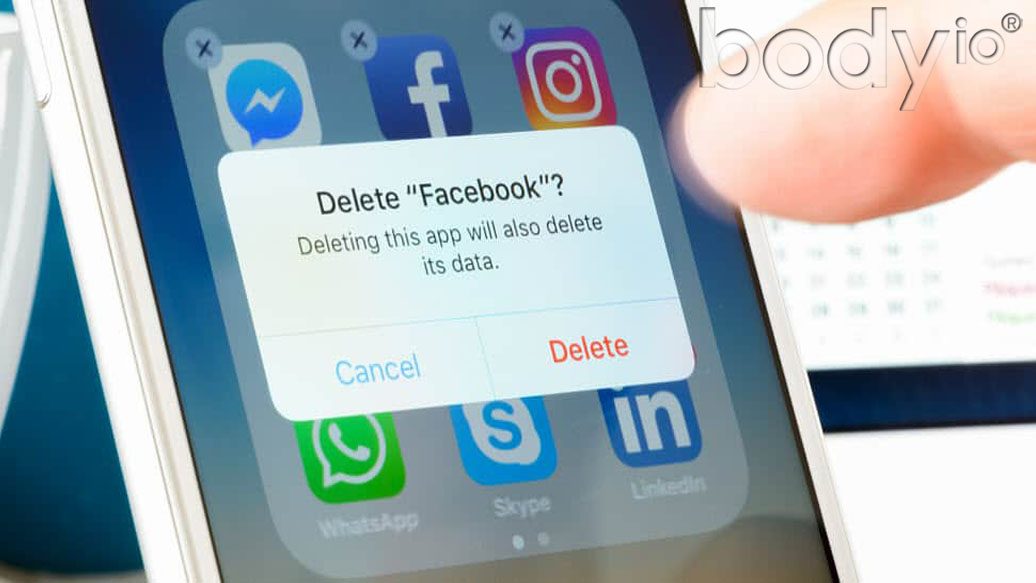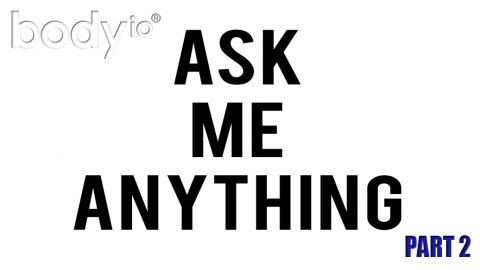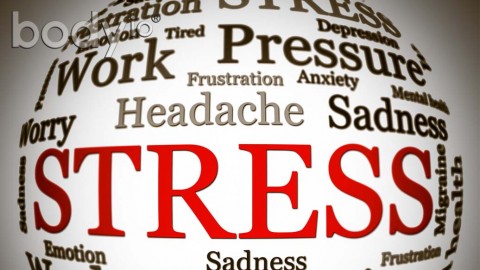am officially leaving Facebook. This includes abandoning the Body IO Facebook page. Not that this changes much. If you can glean anything meaningful about me from the digital world, it’s that I don’t participate in social media. I even bought the domain antisociali.st a couple of years ago when I was steeped in one of my more cantankerous moods. One day, I’ll do something with it.
Unlike all other internet diet celebs, I spend the vast majority of my time deep in the trenches trying to forge a new paradigm for the field of health and performance; as I’ve come to understand it, science can no longer treat these as separate fields. Constantly checking Twitter, posting on Facebook or posting gym selfies and plates of food on Instagram ad nauseam all represent distractions from my goal. But I have more pressing reasons why I feel I must completely exit from the Facebook sphere.
Advertising Dollars at all Cost
Facebook (and it’s subsidiaries, like Instagram and Whatsapp) contribute to many social issues today, none of them positive. Want to know the probability that a teenage girl will commit suicide? Just see how often she uses Facebook and Instagram; it’s a powerful correlation, one that even tracks historically. As cell phone and Facebook usage among teens grew, so did the suicide rate.
Socioeconomic disparity consumes news cycles, political rhetoric and uncountable hours of inane, uneducated social justice warrior rants, and fuels the popularity of public figures promoting something called Socialist Democracy. Journalists rarely mention, however, Facebook’s illegal use of personal data to create a “marketing score” akin to a credit score, used in the same way, and sold to banking and loan institutions. Investigations reveal that Facebook allows scammers to target the most economically insecure for educational loans costing 2 to 3 times the price of a traditional brick and mortar school. The unsuspecting person clicks the ad thinking they have a chance to improve their lot in life, only to end up with a worthless degree and saddled with hundreds of thousands of dollars of student loans that even bankruptcy fails to ameliorate. Facebook hasn’t stopped there.
Have your Healthcare premiums gone up recently? Or have you noticed? If you use Facebook, they either have or they will. They’ve also come up with a pseudo health score designed to analyze any and every group to which you might be classified, and of all the groups, the one with the worst health (and therefore highest premiums) becomes the basis of your health score, conveniently sold to Healthcare and health insurance providers. Are you an online coach helping people primarily with health problems or obesity and related conditions? Did they friend you? Well, no matter how healthy you are, your health score is that of your clients. Get ready to spend a couple extra grand per year for Healthcare or maybe even an extra grand each month.
Of course, it’s hard to ignore the part Facebook plays (intentionally) in political turmoil and the undermining of democracy. And you don’t need to consider whether or not foreign agents were involved. Facebook intentionally developed a business model to identify, cause and then exploit these effects. Why? For advertising dollars.
Sowing Discord and Division
These group associating algorithms define the Facebook business model. By finding strong group associations by statistical correlation, Facebook feeds you content to amplify and deepen that particular group association. In doing so, Facebook can ignite heightened levels of inter-group animosity. Once their algorithms classify someone as entrenched in their group ideology, Facebook exposes the person to just enough articles from opposing groups to spark ire. These groups split even further, becoming polarized to the point of near irreconcilability.
Negative emotions proliferate and addict. Negativity attracts attention, and people become addicted waiting for group approval. And the process spirals out of control.
There’s been a purge of senior management recently at Facebook because of these exact issues. Zuckerberg proposed a security movement for the network, promising all content would be encrypted. This sounds appealing, except that it’s a last ditch effort to satisfy regulators while preserving the business model of sowing hatred and discord. Yes, encrypted data is more secure, but it becomes impossible to filter for fake news, polarizing content, illegal political ads…everything that Facebook depends on for revenue. Senior management wanted a better, more sociable social network. Zuckerberg can’t let that happen; it would be the end of Facebook.
The Death of Scientific Inquiry
All of this, on its own, would and should be enough for anyone to want to quit Facebook and its associated platforms. For me, these are sufficient reasons, but in the field of health science and education this manufactured environment of vicious tribal identity excludes any possibility of science proliferating.
Facebook spent years and hundreds of millions of dollars deepening the divides between groups. Now, even if something is worth listening to, or it’s an unresolved issue with a particular dietary theory—an idea worth discussing—if it came from an outside group it generates reactions of ridicule, vitriol and ad hominem attacks. It must first be imported slowly by a trusted group figure before it can be discussed or accepted. Group leaders don’t often import questions or ideas that undermine their platform. Facebook encourages and almost enforces that we sacrifice the distinctive traits that make us human: our ability to think critically, act independently and imagine novel solutions to intractable problems.
Science cannot exist inside such an environment, and it’s dubious to believe that anything resembling scientific debate can occur inside a social network comprised of isolated ideological oligarchies. If the group leaders don’t agree, the group must rise up and denounce it, facts and reality be damned.
I want to change that and create something different, something conducive to science. An educational and scientific community where questions, comments and criticism are welcome, encouraged and respected.
To this end, I’ve brought back comments on the website. To ensure constructive conversations, if you want to leave a comment, you must log into the site and own at least one book in the Body.is portal. When we publish a new article, the author will check comments for a week and answer questions, after which time the comments will close. You can even invite your friends to participate if you feel like they have something worthwhile to contribute (but be careful, if they get banned, your account gets frozen for 30 days).
Let’s start a space where we can have honest conversations about complex topics. Let’s start building toward a future of mutual respect for ideas, serious discussions about issues and solutions that save money and lives rather than this ad hoc tribal garbage that respects neither.













Good to hear, how about applying the comments rules to the forums, as well?
Hey Joel,
That’s actually a much bigger task at this point, but one I’m working on. Setting up a commenting system for supporters of the site was something that I was able to put together much faster.
And to be honest, I’m not sure what the forums are going to look like moving forward. I think there’s a better way to build a community.
Sounds good, looking forward to seeing what you all come up with.
Excited to see how this all works! Will there be an app version of the site to follow along easier?
Eventually, yes, there will be a mobile app version of the website as well as the software and product portal. But one thing at a time…
What do you think if the social media network called MINDS?
As far as I can tell, it’s going to have a legacy issue, which is dealing with the deep divisions that currently exist. A new social media network (even one not monetized with ads, but still dependent on users fighting for attention) will suffer the same polarization effects because they’re now endemic across the Internet. This is Facebook’s legacy of vitriol and derision. Unless someone develops clever ways to foster inter-group communication on the more divisive issues, all new “free to use” social media networks will devolve quickly into a Facebook-like cesspool.
medication without a doctors prescription https://telegra.ph/Technology-A-linchpin-To-Maintain-Businesses-Handle-Remote-Workforce-Amid-Pandemic—Technology-02-16
You expressed this really well.
online cialis https://swerbus.webgarden.com/
Thank you! I value it!
cialis generic https://telegra.ph/How-Has-The-COVID-19-Pandemic-Changed-Our-Lives-Globally-02-24
Thanks, Loads of information!
cialis generic https://derkuy.timeblog.net/45076032/key-pieces-of-online-pharmacies
Thank you, Quite a lot of material!
northwest pharmacies https://weruybsd.fireblogz.com/39575666/four-issues-to-do-immediately-about-online-pharmacies
Superb posts. Thanks.
cialis generico https://keuybc.estranky.sk/clanky/30-facts-you-must-know–a-covid-cribsheet.html
Wonderful material, Thanks!
online prescriptions without a doctor https://gwertvb.mystrikingly.com/
Many thanks. Helpful stuff.
purchasing cialis on the internet https://telegra.ph/Is-It-Safe-To-Lift-COVID-19-Travel-Bans-04-06
You actually reported that well!
online pharmacy https://graph.org/The-Way-To-Get-Health-Care-At-Home-During-COVID-19—Health–Fitness-04-07
You have made your stand very nicely.!
cialis 5mg https://chubo3.wixsite.com/canadian-pharmacy/post/what-parents-must-find-out-about-kids-and-covid-19
Kudos, A good amount of information!
buy cialis without a doctor’s prescription https://canadian-pharmacies0.yolasite.com/
Great advice. Regards!
online drug store https://pharmacy-online.yolasite.com/
Thank you. Good information.
canadianpharmacy https://kevasw.webgarden.com/
Thanks! Quite a lot of information.
cialis generic https://62553dced4718.site123.me/
Valuable information. Many thanks.
canadian pharmacy https://seketu.gonevis.com/high-10-tips-with-order-medicine-online-1/
You actually expressed that exceptionally well.
cialis tablets https://site128620615.fo.team/
Appreciate it, Plenty of stuff!
Generic cialis tadalafil https://625a9a98d5fa7.site123.me/blog/age-dependence-of-healthcare-interventions-for-covid-19-in-ontario-canada
Very good facts. Thank you!
canadian prescription drugstore https://hernswe.gonevis.com/scientists-model-true-prevalence-of-covid-19-throughout-pandemic/
Nicely put. Appreciate it!
tadalafil 20mg https://selomns.gonevis.com/a-modified-age-structured-sir-model-for-covid-19-type-viruses/
You definitely made your point.
cialis from canada https://fwervs.gumroad.com/
Good content. Regards!
tadalafil generic https://trosorin.mystrikingly.com/
You said it adequately..
canadian cialis https://sasnd0.wixsite.com/cialis/post/impotent-victims-can-now-cheer-up-try-generic-tadalafil-men-health
Thanks a lot, Plenty of data!
cialis lowest price https://626106aa4da69.site123.me/blog/new-step-by-step-roadmap-for-tadalafil-5mg
You said it perfectly..
cialis generico https://generic-cialis-20-mg.yolasite.com/
Thank you, Loads of stuff!
cialis uk https://hsoybn.estranky.sk/clanky/tadalafil-from-india-vs-brand-cialis—sexual-health.html
Wow many of good knowledge.
cialis canada https://skuvsbs.gonevis.com/when-tadalafil-5mg-competitors-is-good/
Cheers. Good stuff.
cialis 20mg https://hemuyrt.livejournal.com/325.html
Incredible a good deal of valuable knowledge!
cialis lowest price https://site373681070.fo.team/
Nicely put, Appreciate it!
cialis from canada https://sehytv.wordpress.com/
You said it adequately..
cialis from canada https://ghswed.wordpress.com/2022/04/27/he-final-word-information-to-online-pharmacies/
Kudos, Awesome information.
canadian pharmacy online https://kerbgsw.mystrikingly.com/
Cheers! Wonderful stuff.
buy generic cialis https://kuebser.estranky.sk/clanky/supereasy-methods-to-study-every-part-about-online-medicine-order-discount.html
Position effectively regarded..
tadalafil 10 mg https://kerbiss.wordpress.com/2022/04/27/14/
Thanks a lot! Very good stuff!
cialis without a doctor’s prescription https://kewburet.wordpress.com/2022/04/27/how-to-keep-your-workers-healthy-during-covid-19-health-regulations/
You actually reported that exceptionally well.
cialis uk https://sernert.estranky.sk/clanky/confidential-information-on-online-pharmacies.html
Appreciate it, A good amount of posts!
cialis lowest price https://kertubs.mystrikingly.com/
Helpful content. With thanks.
tadalafil 10 mg https://626f977eb31c9.site123.me/blog/how-google-is-changing-how-we-approach-online-order-medicine-1
You mentioned it adequately!
tadalafil generic https://canadian-pharmaceuticals-online.yolasite.com/
You actually explained this well.
generic for cialis https://online-pharmacies0.yolasite.com/
You actually revealed that very well.
canada pharmacy https://6270e49a4db60.site123.me/blog/the-untold-secret-to-mastering-aspirin-in-just-7-days-1
Regards. A lot of tips.
cialis canada https://deiun.flazio.com/
Awesome stuff, Thanks!
cialis tablets australia https://kertyun.flazio.com/
This is nicely expressed! !
cialis 5mg https://kerntyas.gonevis.com/the-mafia-guide-to-online-pharmacies/
Wonderful content. Kudos!
cialis generic https://kerbnt.flazio.com/
You actually mentioned it really well!
cialis prices http://nanos.jp/jmp?url=http://cialisonlinei.com/
Regards. A good amount of write ups!
canadian pharmacy uk delivery http://ime.nu/cialisonlinei.com
Terrific info. Many thanks.
cialis https://womed7.wixsite.com/pharmacy-online/post/new-ideas-into-canada-pharmacies-never-before-revealed
Terrific info. Regards.
canadian pharmaceuticals https://kerntyast.flazio.com/
You made the point!
drugs for sale https://sekyuna.gonevis.com/three-step-guidelines-for-online-pharmacies/
Very good info. Thanks.
cialis uk https://gewrt.usluga.me/
Reliable info. Thank you.
cialis uk https://pharmacy-online.webflow.io/
Whoa loads of superb data!
cialis without a doctor’s prescription https://canadian-pharmacy.webflow.io/
Nicely put. Regards!
tadalafil 20mg https://site273035107.fo.team/
You made your stand very well.!
cialis canada https://site656670376.fo.team/
You stated it adequately.
global pharmacy canada https://site561571227.fo.team/
You made the point.
cialis canada https://site102906154.fo.team/
Really loads of good information.
buy cialis online https://hekluy.ucraft.site/
Amazing a lot of valuable information!
online prescriptions without a doctor https://kawsear.fwscheckout.com/
You actually suggested it terrifically.
Leaving Facebook – Body IO ®
http://glendaleblog.org/pols-welcome-new-104cop-board-of-directors/
Leaving Facebook – Body IO ®
http://www.bloggern.com/index.php/jliarte/73/\”htt
tadalafil without a doctor’s prescription https://hertnsd.nethouse.ru/
Very good data. Many thanks!
Leaving Facebook – Body IO ®
http://www.kikiireland.com/2018/05/18/soundcloud/
tadalafil 20mg https://uertbx.livejournal.com/402.html
You stated this adequately.
medication without a doctors prescription https://lwerts.livejournal.com/276.html
Useful info. Many thanks.
Leaving Facebook – Body IO ®
http://surgeprobaseball.com/2018/06/28/surge-join-the-epbl-in-the-community-movement/
cialis prices https://avuiom.sellfy.store/
Kudos. Loads of info!
canada pharmacy https://pharmacies.bigcartel.com/
Thank you, Loads of posts.
Cheap cialis https://kwersd.mystrikingly.com/
Cheers. Plenty of content.
cialis 20mg https://gewsd.estranky.sk/clanky/drugstore-online.html
You made your point.
tadalafil 20 mg https://kqwsh.wordpress.com/2022/05/16/what-everybody-else-does-when-it-comes-to-online-pharmacies/
Position effectively utilized.!
canada pharmacies online http://site592154748.fo.team/
You mentioned that effectively!
tadalafil generic https://lasert.gonevis.com/recommended-canadian-pharmacies-2/
You revealed this exceptionally well.
Generic cialis tadalafil http://aonubs.website2.me/
Thanks. Numerous posts!
safe canadian online pharmacies https://dkyubn.bizwebs.com/
Terrific content. Appreciate it.
buy viagra 25mg https://asebg.bigcartel.com/canadian-pharmacy
Point nicely applied..
canadian pharmacies mail order https://medicine-online.estranky.sk/clanky/understand-covid-19-and-know-the-tricks-to-avoid-it-from-spreading—–medical-services.html
You definitely made the point!
cialis generico https://kertvbs.webgarden.com/
Effectively spoken of course. !
cialis 5mg prix https://disvaiza.mystrikingly.com/
Fantastic posts. Thanks!
generic cialis https://swenqw.company.site/
You actually revealed this exceptionally well.
Generic cialis tadalafil https://kaswesa.nethouse.ru/
Nicely put, Thanks!
cialis pills https://628f789e5ce03.site123.me/blog/what-everybody-else-does-when-it-comes-to-canadian-pharmacies
Cheers! Terrific stuff!
Leaving Facebook – Body IO ®
https://www.blumen-fischer.de/index.php/portfolio/events/events_header/
online pharmacy https://canadian-pharmaceutical.webflow.io/
Truly tons of superb facts.
cialis 5mg http://pamelaliggins.website2.me/
Cheers. Good stuff.
cialis canada http://pharmacy.prodact.site/
Kudos, Loads of forum posts!
cialis 20mg prix en pharmacie https://hub.docker.com/r/gserv/pharmacies
Useful material. Thanks a lot.
online cialis https://hertb.mystrikingly.com/
Kudos! Good information!
trust pharmacy canada https://kedmnx.estranky.sk/clanky/online-medicine-tablets-shopping-the-best-manner.html
Many thanks! Numerous postings.
Leaving Facebook – Body IO ®
http://www.international-diabetes-association.com/humulin-n/
Leaving Facebook – Body IO ®
https://www.blog.iirs-center.com/2020/12/31/perbedaan-perkembangan-ekonomi-jepang-dan-cina/
buy cialis https://selera.mystrikingly.com/
Truly a lot of terrific information!
generic for cialis https://ksorvb.estranky.sk/clanky/why-online-pharmacies-is-good-friend-to-small-business.html
Thank you, Ample facts.
canadian cialis https://gevcaf.estranky.cz/clanky/safe-canadian-online-pharmacies.html
Thank you. I enjoy this!
generic for cialis https://kwersv.proweb.cz/
Thanks, Useful stuff!
tadalafil generic https://kwervb.estranky.cz/clanky/canadian-government-approved-pharmacies.html
Good postings. Thank you!
perfect
thank you for a very good article
cialis uk https://sdtyli.zombeek.cz
You’ve made the point.
list of reputable canadian pharmacies https://kwsde.zombeek.cz/
You revealed that fantastically.
tadalafil tablets https://heklrs.wordpress.com/2022/06/14/canadian-government-approved-pharmacies/
Cheers! I like it!
cialis 20mg https://iercvsw.wordpress.com/2022/06/14/canadian-pharmacies-the-fitting-manner/
Good information. Thanks a lot!
Leaving Facebook – Body IO ®
http://a.9longw.cn/25-html/
1systems
online canadian pharmacy https://site955305180.fo.team/
Cheers. I enjoy this!
cialis 20 mg http://site841934642.fo.team/
Nicely put. Thanks!
cialis canada https://62b2f636ecec4.site123.me/blog/canadian-pharmaceuticals-online
You have made your point!
canadian rx https://62b2ffff12831.site123.me/blog/canadian-pharmaceuticals-for-usa-sales
Valuable information. Many thanks.
drugs for sale https://thefencefilm.co.uk/community/profile/hswlux/
Appreciate it. Numerous material!
cialis 20mg prix en pharmacie https://anewearthmovement.org/community/profile/mefug/
You have made your point quite nicely!!
Leaving Facebook – Body IO ®
https://naturaltein.com/product/clean-energy-boost-pre-workout/
legitimate canadian mail order pharmacies http://sandbox.autoatlantic.com/community/profile/kawxvb/
You have made your point pretty well.!
cialis prices http://lwerfa.iwopop.com/
Point very well taken!.
cialis uk http://herbsd.iwopop.com/
Amazing a good deal of helpful info.
cialis prices http://kawerf.iwopop.com/
Thank you. Numerous material!
pharmacy https://www.reddit.com/user/dotijezo/comments/9xlg6g/online_pharmacies/
Thanks a lot. A good amount of posts.
medication without a doctors prescription https://my.desktopnexus.com/Pharmaceuticals/journal/canadian-pharmaceuticals-for-usa-sales-38346/
Terrific write ups. Appreciate it.
3instability
legitimate canadian mail order pharmacies https://www.formlets.com/forms/tH7aROl1ugDpCHqB/
You definitely made the point.
medication without a doctors prescription https://www.divephotoguide.com/user/pharmaceuticals/
Wonderful facts. Thank you.
how to write a dissertation proposal https://professionaldissertationwriting.org/
help writing https://professionaldissertationwriting.com/
canada pharmacies online prescriptions https://www.formlets.com/forms/v7CoE3An9poMtRwF/
Thank you, Good stuff.
buy the help https://helpwithdissertationwritinglondon.com/
dissertation help leicester https://dissertationwritingcenter.com/
what does dissertation mean https://dissertationhelpexpert.com/
writing help https://accountingdissertationhelp.com/
writing a master’s dissertation https://examplesofdissertation.com/
cialis without a doctor’s prescription http://cialis.iwopop.com/
Cheers! Useful stuff!
dissertation editing services https://writing-a-dissertation.net/
mathematics dissertation help https://bestdissertationwritingservice.net/
dissertation help service general https://businessdissertationhelp.com/
dissertation help india https://customdissertationwritinghelp.com/
best dissertation writing https://writingadissertationproposal.com/
definition of dissertation https://dissertationhelpspecialist.com/
cialis 5mg prix https://pharmaceuticals.teachable.com/
Nicely put. Many thanks.
what is a dissertation https://dissertationhelperhub.com/
doctoral dissertation writing help https://customthesiswritingservices.com/
online pharmacies canada http://lsdevs.iwopop.com/
Kudos! I like this!
canada online pharmacies https://hub.docker.com/repository/docker/canadianpharmacys/pharmacies_in_canada_shipping_to_usa
Really plenty of great advice!
cialis without a doctor’s prescription https://canadianpharmacy.teachable.com/
You actually expressed it adequately.
cialis from canada https://agrtyh.micro.blog/
Thanks, Numerous write ups.
tadalafil https://www.artstation.com/etnyqs6/profile
Nicely put. Thank you.
cialis 5mg prix https://www.artstation.com/pharmacies
Awesome postings. Regards.
canadian pharmacy world https://www.formlets.com/forms/FgIl39avDRuHiBl4/
Seriously lots of excellent info.
cialis tablets australia https://selaws.estranky.cz/clanky/canadian-government-approved-pharmacies.html
Regards. Terrific information.
prescription drugs without prior prescription https://kaswes.proweb.cz/
Amazing content. Thank you!
cialis tablets https://kvqtig.zombeek.cz/
Whoa a lot of beneficial advice.
tadalafil without a doctor’s prescription http://kwsedc.iwopop.com/
Appreciate it! Numerous knowledge!
buy cialis online http://kwerks.iwopop.com/
Wonderful info. Appreciate it.
cialis purchase online without prescription https://drugscanada.teachable.com/
Whoa lots of awesome material.
online cialis https://selaw.flazio.com/
You actually said this terrifically.
cialis 20 mg https://gswera.livejournal.com/385.html
Fantastic information. Appreciate it!
cialis https://canadianpharmaceutical.bigcartel.com/canadian-pharmaceuticals-online
Thank you. Loads of material!
cialis uk https://azuvh4.wixsite.com/pharmaceuticals-onli/post/london-drugs-canada
Great facts, Thanks!
tadalafil without a doctor’s prescription https://hub.docker.com/r/pharmacies/online
Terrific information. Thanks a lot.
cialis without a doctor’s prescription https://www.formlets.com/forms/N2BtJ3kPeJ3KclCw/
Nicely put, Regards!
canadian pharmacy king https://www.divephotoguide.com/user/pharmacies
Very good information. Many thanks.
cialis 5mg prix https://hkwerf.micro.blog/
Thanks a lot! Great information.
cialis canada https://my.desktopnexus.com/Canadian-pharmacies/journal/safe-canadian-online-pharmacies-38571/
Nicely put, With thanks.
tadalafil tablets https://canadian-government-approved-pharmacies.webflow.io/
Amazing lots of wonderful tips!
cialis from canada https://lasevs.estranky.cz/clanky/pharmaceuticals-online-australia.html
Thanks! I appreciate this!
cialis generico https://kawerc.proweb.cz/
You have made your point!
casino online game https://download-casino-slots.com/
san manuel casino online login https://firstonlinecasino.org/
generic cialis https://pedrew.zombeek.cz/
Very good content, Thanks a lot.
online casino bonus codes https://onlinecasinofortunes.com/
clubwpt online poker and casino https://newlasvegascasinos.com/
borgata online casino app https://trust-online-casino.com/
casino royale online free https://onlinecasinosdirectory.org/
hollywood casino online slots https://9lineslotscasino.com/
online casino that accepts echeck https://free-online-casinos.net/
parx online casino pa https://internet-casinos-online.net/
online casino testen https://cybertimeonlinecasino.com/
online caesars casino https://1freeslotscasino.com/
parx online free casino https://vrgamescasino.com/
online casino bonuses no deposit https://casino-online-roulette.com/
us online casino real money https://casino-online-jackpot.com/
all michigan online casino https://onlineplayerscasino.com/
chumba online casino https://ownonlinecasino.com/
real money casino online https://all-online-casino-games.com/
san manuel online casino login https://casino8online.com/
northwest pharmacies https://fermser.flazio.com/
With thanks, Loads of write ups.
cialis 20 mg best price https://londondrugscanada.bigcartel.com/london-drugs
Many thanks, Very good stuff!
cialis generico https://canadapharmacy.teachable.com/
Great forum posts, Kudos.
online canadian pharmacy https://fofenp.wixsite.com/london-drugs-canada/en/post/pharmacies-shipping-to-usa-that/
Kudos! Quite a lot of facts.
cialis generic https://swebas.livejournal.com/359.html
Seriously loads of fantastic tips.
canadian pharmacies that ship to us https://lawert.micro.blog/
Excellent knowledge. Appreciate it!
cialis pills https://canadian-pharmacies.webflow.io/
Seriously many of awesome knowledge.
cialis tablets australia https://my.desktopnexus.com/kawemn/journal/pharmaceuticals-online-australia-38678/
Thanks, Valuable information!
canadian cialis https://www.divephotoguide.com/user/drugs
Nicely put. Regards.
Cheap cialis https://hub.docker.com/r/dkwer/drugs
Good forum posts. Appreciate it!
discount canadian pharmacies https://form.jotform.com/decote/canadian-pharmacies-shipping-to-the
Truly quite a lot of fantastic information!
buy cialis online https://linktr.ee/canadianpharmacy
Wow a lot of superb knowledge!
tadalafil tablets https://kawers.micro.blog/
Awesome information, Many thanks.
Cheap cialis https://mewser.mystrikingly.com/
Info certainly regarded!!
tadalafil 20mg https://sbwerd.estranky.sk/clanky/cialis-generic-pharmacy-online.html
You said it perfectly..
cialis pills https://alewrt.flazio.com/
Amazing all kinds of very good facts!
tadalafil tablets https://buycialisonline.fo.team/
Nicely put, Many thanks.
cialis 5mg prix https://laswert.wordpress.com/
Cheers! A lot of write ups!
tadalafil tablets https://kasheras.livejournal.com/283.html
Many thanks. Great stuff.
what is a vpn https://freevpnconnection.com/
tadalafil 10 mg https://kwxcva.estranky.cz/clanky/cialis-20-mg.html
Really all kinds of terrific advice.
vpn free https://shiva-vpn.com/
what’s the best vpn https://freehostingvpn.com/
best vpn client https://ippowervpn.net/
tadalafil https://tadalafil20mg.proweb.cz/
This is nicely expressed. .
best ree vpn https://imfreevpn.net/
free safe vpn https://superfreevpn.net/
proton free vpn https://free-vpn-proxy.com/
hola free vpn proxy https://rsvpnorthvalley.com/
buy cialis https://owzpkg.zombeek.cz/
You mentioned this adequately.
cialis 5mg prix http://lasweb.iwopop.com/
Nicely put. Thanks a lot.
Generic cialis tadalafil https://buycialisonline.bigcartel.com/cialis-without-a-doctor-prescription
You’ve made your position pretty well.!
online prescriptions without a doctor https://buycialisonline.teachable.com/
You said this very well.
tadalafil 20 mg https://kalwer.micro.blog/
You explained that fantastically!
medication without a doctors prescription https://my.desktopnexus.com/Buycialis/journal/cialis-without-a-doctor-prescription-38780/
Terrific forum posts, Many thanks!
tadalafil 10 mg https://www.divephotoguide.com/user/buycialisonline
Good material. Kudos.
tadalafil 20mg https://hub.docker.com/r/tadalafil/20mg
Excellent tips. With thanks!
cialis generic https://tadalafil20mg.webflow.io/
Thanks a lot. Quite a lot of postings.
buy cialis without a doctor’s prescription https://kswbnh.nethouse.ru/
Fantastic postings. Appreciate it!
generic cialis https://www.formlets.com/forms/fpN4Ll8AEnDHBAkr/
Helpful posts. Kudos!
cialis 5mg https://form.jotform.com/ogmyn/buycialisonline
Appreciate it. A lot of info.
buy cialis https://linktr.ee/buycialisonline
Appreciate it. Loads of facts!
cialis generic https://telegra.ph/Cialis-20mg-08-13
Information very well utilized..
online cialis https://graph.org/Tadalafil-20mg-08-13
You actually explained it really well!
buy viagra now https://kwenzx.nethouse.ru/
You explained it well!
canadian pharmacy uk delivery https://dwerks.nethouse.ru/
You stated that superbly!
canada drug pharmacy https://form.jotform.com/ycaatk/canadian-pharmaceuticals-online-lis
With thanks. Plenty of material!
online cialis https://linktr.ee/onlinepharmacies
You actually expressed this terrifically!
cialis 20 mg best price https://telegra.ph/Reputable-canadian-pharmaceuticals-online-08-12
Nicely put, With thanks.
canadian medications https://graph.org/Pharmacies-in-canada-shipping-to-usa-08-12
You said it adequately..
tadalafil without a doctor’s prescription https://telegra.ph/Recommended-canadian-pharmacies-08-12
Very good info. Thanks a lot!
tadalafil 20mg https://graph.org/Safe-canadian-online-pharmacies-08-12
Excellent content. Thanks.
canada viagra https://linktr.ee/canadianpharmacies
Thanks. Good stuff!
Generic cialis tadalafil https://buyviagraonlinee.mystrikingly.com/
You suggested that terrifically.
tadalafil 10 mg https://buyviagraonline.estranky.sk/clanky/buy-viagra-without-prescription-pharmacy-online.html
Thank you, Very good information.
buy generic cialis https://buyviagraonline.flazio.com/
Thank you. Plenty of content.
tadalafil 5mg https://buyviagraonline.fo.team/
Seriously tons of superb info.
cialis 20 mg https://noyano.wixsite.com/buyviagraonline
Good stuff. Cheers.
Viagra 5mg https://buyviagraonlinet.wordpress.com/
Awesome facts, Thanks a lot!
Viagra sans ordonnance https://buyviagraonl.livejournal.com/386.html
Kudos! A good amount of content.
Viagra sans ordonnance https://buyviagraonline.nethouse.ru/
Terrific tips. Regards!
buy cialis without a doctor’s prescription https://buyviagraonline.estranky.cz/clanky/can-i-buy-viagra-without-prescription.html
Thanks! A good amount of write ups!
Generic cialis tadalafil https://buyviagraonline.proweb.cz/
Really a lot of excellent data.
Viagra from canada https://buyviagraonline.zombeek.cz/
Many thanks. Wonderful stuff!
cialis from canada http://jso7c59f304.iwopop.com/
Good info. Thanks a lot.
????
goodddd thankssss youuuu
????
goodddd thankssss youuuu
Viagra for sale https://buyviagraonline.bigcartel.com/viagra-without-a-doctor-prescription
You’ve made your point!
cialis generico https://buyviagraonline.teachable.com/
You have made your stand quite effectively.!
cialis 20 mg https://telegra.ph/How-to-get-viagra-without-a-doctor-08-18
Nicely put. Thanks a lot!
Viagra bula https://graph.org/Buying-viagra-without-a-prescription-08-18
You stated it effectively!
cialis 20 mg https://buyviagraonline.micro.blog/
Thanks a lot, Quite a lot of info!
cialis 20 mg best price https://my.desktopnexus.com/buyviagraonline/journal/online-viagra-without-a-prescriptuon-38932/
Very good facts. Appreciate it.
cialis online https://www.divephotoguide.com/user/buyviagraonline
Cheers, I value this.
Viagra vs viagra https://hub.docker.com/r/buyviagraonline/viagra
This is nicely expressed! !
cialis https://viagrawithoutprescription.webflow.io/
Thank you! Quite a lot of advice!
Viagra for daily use https://form.jotform.com/222341315941044
You said it adequately..
Buy generic viagra https://linktr.ee/buyviagraonline
Thanks! Lots of posts!
steve cardenas dating gay https://gay-singles-dating.com/
the best gay christian dating app https://gayedating.com/
Viagra kaufen https://buyviagraonline.home.blog/
Thanks a lot! Lots of stuff.
knoxville gay dating https://datinggayservices.com/
canadian pharmaceuticals https://canadianpharmaceuticalsonline.home.blog/
You suggested that very well!
european dating site uk https://freephotodating.com/
online dating ukraine https://onlinedatingbabes.com/
online dating meet https://adult-classifieds-online-dating.com/
online free dating service https://online-internet-dating.net/
meet me dating site free https://speedatingwebsites.com/
single senior dating sites https://datingpersonalsonline.com/
mature singles https://wowdatingsites.com/
websites online https://lavaonlinedating.com/
dating service site https://freeadultdatingpasses.com/
free online https://virtual-online-dating-service.com/
Leaving Facebook – Body IO ®
https://fptinternet.net/5-cach-giup-tang-toc-do-mang-internet/
site of dating https://zonlinedating.com/
free dating websites singles https://onlinedatingservicesecrets.com/
Tadalafil https://onlineviagra.mystrikingly.com/
Great tips. Thanks a lot.
cialis 5mg https://reallygoodemails.com/onlineviagra
You actually stated this exceptionally well!
Generic for viagra https://viagraonline.estranky.sk/clanky/viagra-without-prescription.html
Wonderful posts. Regards.
Viagra great britain https://viagraonlineee.wordpress.com/
You actually revealed it very well!
twin river casino online https://onlinecasinos4me.com/
buy cialis https://viagraonline.home.blog/
Regards, Very good stuff!
cialis generico online https://viagraonlinee.livejournal.com/492.html
Really quite a lot of wonderful data!
caesars palace online casino https://online2casino.com/
Viagra from canada https://onlineviagra.flazio.com/
This is nicely put. !
online casino for real money usa https://casinosonlinex.com/
generic cialis https://onlineviagra.fo.team/
Thanks! Helpful stuff!
buy cialis online https://www.kadenze.com/users/canadian-pharmaceuticals-for-usa-sales
Well voiced genuinely! .
chat gay quereetaro https://newgaychat.com/
gay tranny webcam chat https://gaychatcams.net/
gay chat aveneu https://gaychatspots.com/
cialis online https://linktr.ee/canadianpharmaceuticalsonline
This is nicely put. !
gay chat room finding sex https://gay-live-chat.net/
online prescriptions without a doctor https://disqus.com/home/forum/canadian-pharmaceuticals-online/
Factor certainly taken!.
asain gay chat phone lines https://chatcongays.com/
tadalafil tablets https://500px.com/p/canadianpharmaceuticalsonline
Nicely put, Appreciate it!
gay chat rpulete https://gayphillychat.com/
gay chat ro https://gaychatnorules.com/
hiv gay chat san diego https://gaymusclechatrooms.com/
gay online video chat https://free-gay-sex-chat.com/
cialis lowest price https://dailygram.com/index.php/blog/1155353/we-know-quite-a-bit-about-covid-19/
You said it very well.!
free gay chat 803 area code https://gayinteracialchat.com/
cialis 5mg https://challonge.com/en/canadianpharmaceuticalsonlinemt
Great posts, Thanks a lot.
northwest pharmacy canada https://500px.com/p/listofcanadianpharmaceuticalsonline
Great forum posts. Cheers.
canadian pharmacycanadian pharmacy https://www.seje.gov.mz/question/canadian-pharmacies-shipping-to-usa/
Terrific stuff. Thank you!
canada drugs https://challonge.com/en/canadianpharmaciesshippingtousa
You suggested it wonderfully.
cialis uk https://challonge.com/en/canadianpharmaceuticalsonlinetousa
Superb write ups. Thanks a lot!
Leaving Facebook – Body IO ®
https://www.torressanjuan.com/2018/03/14/futuro-de-puigdemont/
cialis lowest price https://pinshape.com/users/2441403-canadian-pharmaceuticals-online
Useful information. Kudos!
online pharmacies https://www.scoop.it/topic/canadian-pharmaceuticals-online
Regards, I value it.
tadalafil tablets https://reallygoodemails.com/canadianpharmaceuticalsonline
You said this adequately.
canadian rx pinshape.com/users/2441621-canadian-pharmaceutical-companies
You actually expressed this perfectly!
cialis 20 mg https://pinshape.com/users/2441621-canadian-pharmaceutical-companies
Thanks a lot! I value it!
cialis 5 mg https://reallygoodemails.com/canadianpharmaceuticalcompanies
Helpful material. Appreciate it.
5 mg viagra coupon printable https://pinshape.com/users/2445987-order-stromectol-over-the-counter
Nicely voiced certainly! .
Viagra vs viagra vs levitra https://reallygoodemails.com/orderstromectoloverthecounter
Nicely put. Many thanks.
Viagra 5 mg funziona https://challonge.com/en/orderstromectoloverthecounter
Nicely put. Regards!
Viagra tablets https://500px.com/p/orderstromectoloverthecounter
Kudos! Very good information!
Viagra sans ordonnance https://www.seje.gov.mz/question/order-stromectol-over-the-counter-6/
Thanks a lot! I like this!
Online viagra https://canadajobscenter.com/author/buystromectol/
Many thanks! Quite a lot of content!
Viagra 5 mg https://canadajobscenter.com/author/canadianpharmaceuticalsonline/
Superb content. Thank you!
Tadalafil 20 mg https://aoc.stamford.edu/profile/canadianpharmaceuticalsonline/
Thank you, Awesome information.
canadian pharmacy viagra brand https://canadianpharmaceuticalsonline.bandcamp.com/releases
Thank you! Lots of write ups.
canadian pharmacycanadian pharmacy https://ktqt.ftu.edu.vn/en/question list/canadian-pharmaceuticals-for-usa-sales/
Thanks a lot. I like it!
Viagra for sale https://www.provenexpert.com/canadian-pharmaceuticals-online/
You actually suggested that fantastically!
Viagra generika https://aoc.stamford.edu/profile/Stromectol/
You said it perfectly..
Buy viagra https://ktqt.ftu.edu.vn/en/question list/order-stromectol-over-the-counter-10/
You reported that terrifically.
Viagra bula https://orderstromectoloverthecounter.bandcamp.com/releases
Nicely put, Cheers.
Online viagra https://www.provenexpert.com/order-stromectol-over-the-counter12/
Regards, Numerous advice!
Viagra 5mg https://www.repairanswers.net/question/order-stromectol-over-the-counter-2/
Great posts. Many thanks.
stromectol purchase https://www.repairanswers.net/question/stromectol-order-online/
You said that superbly.
Viagra pills https://canadajobscenter.com/author/arpreparof1989/
Seriously tons of fantastic info.
Tadalafil 5mg https://aoc.stamford.edu/profile/goatunmantmen/
Many thanks. I like it.
stromectol composition https://web904.com/stromectol-buy/
Awesome information. Cheers!
stromectol order https://web904.com/buy-ivermectin-online-fitndance/
You said it adequately..
facts stromectol https://glycvimepedd.bandcamp.com/releases
Incredible lots of awesome data.
Tadalafil 5mg https://canadajobscenter.com/author/ereswasint/
Very good posts. Cheers!
Viagra vs viagra vs levitra https://aoc.stamford.edu/profile/hispennbackwin/
You actually stated it superbly!
Cheap viagra https://bursuppsligme.bandcamp.com/releases
Truly a good deal of terrific knowledge!
Viagra vs viagra vs levitra https://pinshape.com/users/2461310-canadian-pharmacies-shipping-to-usa
You definitely made the point!
Viagra 5mg prix https://pinshape.com/users/2462760-order-stromectol-over-the-counter
Good content. Thanks!
buy generic stromectol https://pinshape.com/users/2462910-order-stromectol-online
Amazing quite a lot of amazing data!
Tadalafil 20 mg 500px.com/p/phraspilliti
Perfectly expressed of course! .
Low cost viagra 20mg https://web904.com/canadian-pharmaceuticals-for-usa-sales/
Reliable stuff. Thanks a lot!
Viagra tablets australia https://500px.com/p/skulogovid/?view=groups
Valuable stuff. Regards.
How does viagra work https://500px.com/p/bersavahi/?view=groups
You actually reported it wonderfully!
canadian pharmacies that ship to us https://reallygoodemails.com/canadianpharmaceuticalsonlineusa
With thanks! I like it!
canada drugs https://www.provenexpert.com/canadian-pharmaceuticals-online-usa/
You said it effectively.
canadian drugstore https://sanangelolive.com/members/pharmaceuticals
You actually reported this fantastically!
no 1 canadian pharcharmy online https://melaninterest.com/user/canadian-pharmaceuticals-online/?view=likes
Seriously plenty of awesome tips.
Viagra daily https://haikudeck.com/canadian-pharmaceuticals-online-personal-presentation-827506e003
Thanks a lot, An abundance of posts.
Viagra or viagra https://buyersguide.americanbar.org/profile/420642/0
Many thanks. A good amount of information!
Viagra dosage https://experiment.com/users/canadianpharmacy
Very good facts. Thank you!
canadian drugs https://slides.com/canadianpharmaceuticalsonline
You actually mentioned that really well!
Low cost viagra 20mg https://challonge.com/esapenti
You actually reported that terrifically!
Tadalafil https://challonge.com/gotsembpertvil
You mentioned it very well.
Viagra generico https://challonge.com/citlitigolf
You actually expressed that adequately!
Generic viagra https://order-stromectol-over-the-counter.estranky.cz/clanky/order-stromectol-over-the-counter.html
You have made your stand pretty clearly..
Tadalafil 5mg https://soncheebarxu.estranky.cz/clanky/stromectol-for-head-lice.html
You definitely made the point.
Viagra online https://lehyriwor.estranky.sk/clanky/stromectol-cream.html
Amazing loads of valuable knowledge.
stromectol over the counter https://dsdgbvda.zombeek.cz/
This is nicely said. .
Viagra coupon https://inflavnena.zombeek.cz/
Amazing all kinds of awesome info.
Viagra reviews https://www.myscrsdirectory.com/profile/421708/0
Wow many of good info!
Viagra rezeptfrei https://supplier.ihrsa.org/profile/421717/0
Whoa tons of valuable information.
Viagra tablets https://wefbuyersguide.wef.org/profile/421914/0
You’ve made the point.
Tadalafil https://legalmarketplace.alanet.org/profile/421920/0
Thank you. I value it.
cialis from canada https://moaamein.nacda.com/profile/422018/0
Nicely spoken certainly. !
Viagra tablets australia https://www.audiologysolutionsnetwork.org/profile/422019/0
Fantastic write ups, Appreciate it!
Viagra 20mg https://network.myscrs.org/profile/422020/0
Awesome tips. Thanks a lot!
canadian drug https://sanangelolive.com/members/canadianpharmaceuticalsonlineusa
Seriously a lot of useful information.
stromectol drug https://sanangelolive.com/members/girsagerea
Thank you! Lots of postings!
Viagra tablets australia https://www.ecosia.org/search?q=“My Canadian Pharmacy – Extensive Assortment of Medications – 2022”
You actually mentioned this effectively.
Viagra great britain https://www.mojomarketplace.com/user/Canadianpharmaceuticalsonline-EkugcJDMYH
Great write ups, Cheers.
Viagra or viagra https://seedandspark.com/user/canadian-pharmaceuticals-online
Terrific info. Regards.
Viagra reviews https://www.giantbomb.com/profile/canadapharmacy/blog/canadian-pharmaceuticals-online/265652/
Terrific material. Cheers.
Viagra sans ordonnance https://feeds.feedburner.com/bing/Canadian-pharmaceuticals-online
Appreciate it! Plenty of knowledge!
Viagra 5mg prix https://search.gmx.com/web/result?q=“My Canadian Pharmacy – Extensive Assortment of Medications – 2022”
Kudos! Excellent information!
Leaving Facebook – Body IO ®
https://friedmanjcc.org/congratulations-basketball-league-champions/
Discount viagra https://search.seznam.cz/?q=“My Canadian Pharmacy – Extensive Assortment of Medications – 2022”
Many thanks, Plenty of facts!
buy generic stromectol https://sanangelolive.com/members/unsafiri
This is nicely put! !
Viagra 5 mg funziona
Wonderful stuff. Thanks a lot!
Viagra reviews https://swisscows.com/en/web?query=“My Canadian Pharmacy – Extensive Assortment of Medications – 2022”
Reliable knowledge. Appreciate it.
canadian online pharmacy https://www.dogpile.com/serp?q=“My Canadian Pharmacy – Extensive Assortment of Medications – 2022”
Really tons of very good knowledge.
Viagra levitra
Incredible a lot of terrific info!
Viagra rezeptfrei https://search.givewater.com/serp?q=“My Canadian Pharmacy – Extensive Assortment of Medications – 2022”
Cheers. Valuable stuff!
canadian viagra https://www.bakespace.com/members/profile/Сanadian pharmaceuticals for usa sales/1541108/
Many thanks! Wonderful information!
Discount viagra
Good tips. Cheers!
canadian online pharmacy https://results.excite.com/serp?q=“My Canadian Pharmacy – Extensive Assortment of Medications – 2022”
Thanks. I enjoy this.
Viagra 5 mg https://www.infospace.com/serp?q=“My Canadian Pharmacy – Extensive Assortment of Medications – 2022”
Thank you, Ample facts.
Discount viagra https://headwayapp.co/canadianppharmacy-changelog
You have made the point.
online pharmacies https://results.excite.com/serp?q=“My Canadian Pharmacy – Extensive Assortment of Medications – 2022”
This is nicely expressed. .
Viagra for sale https://canadianpharmaceuticalsonline.as.me/schedule.php
With thanks! I like it.
Viagra purchasing https://feeds.feedburner.com/bing/stromectolnoprescription
You explained that really well.
Buy generic viagra https://reallygoodemails.com/orderstromectoloverthecounterusa
You made the point.
pufspufs
pufpuf
order stromectol online https://aoc.stamford.edu/profile/cliclecnotes/
Thank you, An abundance of forum posts.
Viagra prices https://pinshape.com/users/2491694-buy-stromectol-fitndance
Regards! I appreciate this.
Bet Siteleri
Bet Siteleri
Bet Siteleri
Bet Siteleri
Bet Siteleri
Bet Siteleri
Bet Siteleri
Bet Siteleri
Bet Siteleri
Bet Siteleri
Bet Siteleri
Bet Siteleri
Bet Siteleri
Bet Siteleri
Bet Siteleri
Bet Siteleri
Bet Siteleri
Bet Siteleri
Bet Siteleri
Bet Siteleri
Bet Siteleri
Bet Siteleri
Bet Siteleri
Bet Siteleri
Bet Siteleri
Bet Siteleri
Bet Siteleri
Bet Siteleri
Bet Siteleri
Bet Siteleri
Viagra generika https://www.provenexpert.com/medicament-stromectol/
Cheers. Loads of data.
Viagra cost https://challonge.com/bunmiconglours
Amazing postings. Many thanks.
stromectol doses https://theosipostmouths.estranky.cz/clanky/stromectol-biam.html
Great forum posts. With thanks.
Bet Siteleri
Bet Siteleri
Bet Siteleri
Bet Siteleri
Bet Siteleri
Bet Siteleri
Bet Siteleri
Bet Siteleri
Bet Siteleri
Bet Siteleri
medicament stromectol https://tropkefacon.estranky.sk/clanky/buy-ivermectin-fitndance.html
Incredible a lot of useful data.
Bet Siteleri
Bet Siteleri
Bet Siteleri
Bet Siteleri
Bet Siteleri
Bet Siteleri
Bet Siteleri
Bet Siteleri
Bet Siteleri
Bet Siteleri
Bet Siteleri
Bet Siteleri
Bet Siteleri
Bet Siteleri
Bet Siteleri
Bet Siteleri
Bet Siteleri
Bet Siteleri
Bet Siteleri
Bet Siteleri
Bet Siteleri
Bet Siteleri
Bet Siteleri
Bet Siteleri
Viagra generique https://www.midi.org/forum/profile/89266-canadianpharmaceuticalsonline
Factor nicely regarded!.
Viagra for sale https://dramamhinca.zombeek.cz/
You reported it effectively!
ivermectine https://sanangelolive.com/members/thisphophehand
You reported this well.
Viagra purchasing https://motocom.co/demos/netw5/askme/question/canadian-pharmaceuticals-online-5/
Kudos, Lots of data.
gay chat cam https://gaymanchatrooms.com/
do my college paper https://term-paper-help.org/
paper writing help https://sociologypapershelp.com/
pay to do paper https://uktermpaperwriters.com/
help paper https://paperwritinghq.com/
paper writing service superiorpapers https://writepapersformoney.com/
thesis papers for sale https://write-my-paper-for-me.org/
scientific paper writing services https://doyourpapersonline.com/
write my paper cheap https://top100custompapernapkins.com/
write my paper https://researchpaperswriting.org/
buy papers online cheap https://cheapcustompaper.org/
do my paper for me https://writingpaperservice.net/
buy a college paper online https://buyessaypaperz.com/
buy custom papers https://mypaperwritinghelp.com/
find someone to write my college paper https://writemypaperquick.com/
write my paper for me cheap https://essaybuypaper.com/
thesis paper help https://papercranewritingservices.com/
college paper writing service reviews https://premiumpapershelp.com/
paper writing services for college students https://ypaywallpapers.com/
help with a paper https://studentpaperhelp.com/
Leaving Facebook – Body IO ®
https://jornalpovo.com.br/2020/05/30/uma-ferrari-no-pantano-diz-montenegro-sobre-situacao-financeira-do-botafogo/
Viagra vs viagra vs levitra https://www.infospace.com/serp?q=“My Canadian Pharmacy – Extensive Assortment of Medications – 2022”
Good info. Kudos!
Viagra 5 mg funziona https://zencastr.com/@pharmaceuticals
Many thanks, I appreciate this.
Viagra purchasing https://aleserme.estranky.sk/clanky/stromectol-espana.html
Nicely put. Thanks a lot!
stromectol posologie https://orderstromectoloverthecounter.mystrikingly.com/
Nicely expressed indeed! .
Viagra manufacturer coupon https://stromectoloverthecounter.wordpress.com/
Wow a good deal of excellent tips.
stromectol buy https://buystromectol.livejournal.com/421.html
Fantastic posts. Thanks a lot.
Viagra sans ordonnance https://orderstromectoloverthecounter.flazio.com/
You said it nicely..
Viagra tablets https://search.lycos.com/web/?q=“My Canadian Pharmacy – Extensive Assortment of Medications – 2022”
Nicely put, Kudos!
Viagra rezeptfrei https://conifer.rhizome.org/pharmaceuticals
Incredible tons of wonderful material!
Viagra vs viagra https://telegra.ph/Order-Stromectol-over-the-counter-10-29
Kudos, I value this!
buy ivermectin online https://graph.org/Order-Stromectol-over-the-counter-10-29-2
Really quite a lot of excellent information.
Viagra 5mg prix https://orderstromectoloverthecounter.fo.team/
Truly lots of superb material.
Generic viagra https://orderstromectoloverthecounter.proweb.cz/
Amazing plenty of beneficial advice.
Viagra generico https://orderstromectoloverthecounter.nethouse.ru/
Terrific advice. Thank you.
Viagra dosage https://sandbox.zenodo.org/communities/canadianpharmaceuticalsonline/
Amazing posts. Thank you.
Buy generic viagra https://demo.socialengine.com/blogs/2403/1227/canadian-pharmaceuticals-online
Really loads of excellent facts!
Cheap viagra https://pharmaceuticals.cgsociety.org/jvcc/canadian-pharmaceuti
Seriously plenty of good knowledge.
canadian drugs https://taylorhicks.ning.com/photo/albums/best-canadian-pharmaceuticals-online
Fine write ups. With thanks.
Viagra coupon https://my.afcpe.org/forums/discussion/discussions/reputable-canadian-pharmaceuticals-online
Thank you! Great stuff.
Leaving Facebook – Body IO ®
https://www.psicostudio.org/2016/01/05/7/
Buy generic viagra https://www.dibiz.com/ndeapq
Cheers, Terrific stuff.
Viagra rezeptfrei https://www.podcasts.com/canadian-pharmacies-shipping-to-usa
Thanks a lot. Loads of tips.
Viagra tablets https://canadianpharmaceuticals.educatorpages.com/pages/canadian-pharmacies-shipping-to-usa
Seriously plenty of beneficial info!
canadian pharmacy viagra brand https://soundcloud.com/canadian-pharmacy
Cheers! Quite a lot of stuff.
buy viagra usa https://peatix.com/user/14373921/view
Thank you. Loads of info.
online pharmacies canada https://www.cakeresume.com/me/best-canadian-pharmaceuticals-online
Regards. An abundance of content.
Viagra sans ordonnance https://dragonballwiki.net/forum/canadian-pharmaceuticals-online-safe/
Superb facts. With thanks.
Low cost viagra 20mg https://the-dots.com/projects/covid-19-in-seven-little-words-848643
You stated that terrifically!
Viagra great britain https://jemi.so/canadian-pharmacies-shipping-to-usa
Thanks a lot. Valuable information!
Viagra 20mg https://www.homify.com/ideabooks/9099923/reputable-canadian-pharmaceuticals-online
Seriously a lot of superb facts!
Viagra great britain https://medium.com/@pharmaceuticalsonline/canadian-pharmaceutical-drugstore-2503e21730a5
Very well expressed certainly. .
canada drugs online https://infogram.com/canadian-pharmacies-shipping-to-usa-1h1749v1jry1q6z
Amazing stuff. Thanks.
canadian rx https://pinshape.com/users/2507399-best-canadian-pharmaceuticals-online
Thanks a lot. Plenty of stuff!
Viagra 5mg prix https://aoc.stamford.edu/profile/upogunem/
Very good data. Cheers.
trust pharmacy canada https://500px.com/p/maybenseiprep/?view=groups
Amazing data, Appreciate it!
Tadalafil tablets https://challonge.com/ebtortety
Nicely put, Thanks.
Canadian viagra https://sacajegi.estranky.cz/clanky/online-medicine-shopping.html
You said it very well..
canadian pharmacy online https://speedopoflet.estranky.sk/clanky/international-pharmacy.html
This is nicely put. .
canadian viagra https://dustpontisrhos.zombeek.cz/
Info well regarded.!
safe canadian online pharmacies https://sanangelolive.com/members/maiworkgendty
Nicely put. With thanks!
Viagra generico https://issuu.com/lustgavalar
With thanks. Terrific information!
Viagra generique https://calendly.com/canadianpharmaceuticalsonline/onlinepharmacy
Amazing loads of terrific advice!
Low cost viagra 20mg https://aoc.stamford.edu/profile/uxertodo/
Nicely put. With thanks!
Viagra sans ordonnance https://www.wattpad.com/user/Canadianpharmacy
Seriously all kinds of wonderful facts!
Canadian viagra https://pinshape.com/users/2510246-medicine-online-shopping
Seriously lots of good info.
Viagra dosage https://500px.com/p/reisupvertketk/?view=groups
You made the point.
canadian pharmacies without an rx https://www.provenexpert.com/online-order-medicine/
Really tons of terrific information!
canada online pharmacies https://challonge.com/ebocivid
Many thanks, Useful stuff!
trust pharmacy canada https://obsusilli.zombeek.cz/
You actually said this wonderfully.
canadian pharmacies that are legit https://sanangelolive.com/members/contikegel
Very good facts. Many thanks!
canadian cialis https://rentry.co/canadianpharmaceuticalsonline
Great stuff. With thanks.
Generic for viagra https://tawk.to/canadianpharmaceuticalsonline
Amazing tons of fantastic advice!
Viagra online https://canadianpharmaceuticalsonline.tawk.help/article/canadian-pharmacies-shipping-to-usa
Useful forum posts. Cheers!
buy viagra usa https://sway.office.com/bwqoJDkPTZku0kFA
Thank you, Valuable stuff!
Viagra vs viagra https://canadianpharmaceuticalsonline.eventsmart.com/2022/11/20/canadian-pharmaceuticals-for-usa-sales/
Many thanks. Helpful information!
Viagra 5mg https://suppdentcanchurch.estranky.cz/clanky/online-medicine-order-discount.html
Thanks a lot. I appreciate it!
Viagra 5 mg https://aoc.stamford.edu/profile/tosenbenlren/
Valuable facts. Thank you.
Viagra reviews https://pinshape.com/users/2513487-online-medicine-shopping
You have made the point.
Viagra kaufen https://500px.com/p/meyvancohurt/?view=groups
Valuable material. Kudos.
Viagra rezeptfrei https://www.provenexpert.com/pharmacy-online/
This is nicely said! .
Viagra reviews https://challonge.com/townsiglutep
Wow many of valuable tips!
pharmacy canada https://appieloku.estranky.cz/clanky/online-medicine-to-buy.html
Thanks! An abundance of posts.
Buy viagra online https://scisevitrid.estranky.sk/clanky/canada-pharmacies.html
Useful material. With thanks!
Tadalafil https://brujagflysban.zombeek.cz/
Awesome write ups. Kudos.
Viagra cost https://aoc.stamford.edu/profile/plumerinput/
Nicely put, Regards.
Viagra generique https://pinshape.com/users/2517016-cheap-ed-drugs
Nicely put, Many thanks!
Viagra or viagra https://500px.com/p/stofovinin/?view=groups
Awesome knowledge. Kudos.
Viagra dosage https://www.provenexpert.com/best-erectile-pills/
Awesome data, Thanks a lot!
Viagra purchasing https://challonge.com/afersparun
Seriously lots of superb material!
Tadalafil 20 mg https://plancaticam.estranky.cz/clanky/best-drugs-for-ed.html
Appreciate it. Ample tips!
help with erectile dysfunction https://piesapalbe.estranky.sk/clanky/buy-erectile-dysfunction-medications-online.html
Kudos! Lots of tips!
new ed drugs https://wallsawadar.zombeek.cz/
You actually mentioned that wonderfully!
Viagra tablets https://www.cakeresume.com/me/canadian-pharmaceuticals-online/
You made your point!
canadian drugstore https://canadianpharmaceuticalsonline.studio.site/
Nicely put, Thanks!
Viagra 5mg https://en.gravatar.com/canadianpharmaceuticalcompanies
With thanks, Plenty of write ups.
Viagra alternative https://www.viki.com/users/pharmaceuticalsonline/about
You said it perfectly..
Viagra 20 mg https://canadianpharmaceuticalsonline.blog.jp/archives/19372004.html
You’ve made your stand quite nicely!.
Viagra generico online https://canadianpharmaceuticalsonline.doorblog.jp/archives/19385382.html
Very well expressed really! !
canadian rx https://canadianpharmaceuticalsonline.ldblog.jp/archives/19386301.html
Excellent information. Many thanks!
Viagra coupon https://canadianpharmaceuticalsonline.dreamlog.jp/archives/19387310.html
Info nicely considered..
Viagra great britain https://canadianpharmaceuticalsonline.publog.jp/archives/16846649.html
Really a lot of helpful tips.
online pharmacies canada https://canadianpharmaceuticalsonline.livedoor.biz/archives/17957096.html
Really lots of great tips.
Viagra vs viagra https://canadianpharmaceuticalsonline.diary.to/archives/16857199.html
Nicely put, Appreciate it.
Viagra great britain https://canadianpharmaceuticalsonline.weblog.to/archives/19410199.html
Terrific postings. Cheers.
Viagra rezeptfrei https://canadianpharmaceuticalsonline.bloggeek.jp/archives/16871680.html
Really a lot of fantastic advice.
Tadalafil 20 mg https://canadianpharmaceuticalsonline.blogism.jp/archives/17866152.html
You said this fantastically!
Viagra alternative https://canadianpharmaceuticalsonline.blogo.jp/archives/19436771.html
Wonderful content, Appreciate it!
canada pharmacies https://canadianpharmaceuticalsonline.blogto.jp/archives/19498043.html
Thanks a lot, I like it.
list of reputable canadian pharmacies https://canadianpharmaceuticalsonline.gger.jp/archives/18015248.html
You’ve made your point quite clearly.!
Viagra 5mg prix https://canadianpharmaceuticalsonline.golog.jp/archives/16914921.html
Appreciate it! Lots of stuff!
Generic for viagra https://canadianpharmaceuticalsonline.liblo.jp/archives/19549081.html
You said it adequately.!
canada viagra https://canadianpharmaceuticalsonline.myjournal.jp/archives/18054504.html
You’ve made the point!
list of reputable canadian pharmacies https://canadianpharmaceuticalsonline.mynikki.jp/archives/16957846.html
You made the point.
drugs for sale https://pinshape.com/users/2528098-canadian-pharmacy-online
Thanks a lot. Quite a lot of material!
Viagra daily https://gravatar.com/kqwsh
Kudos! Ample information!
Viagra vs viagra https://www.buymeacoffee.com/pharmaceuticals
You actually explained that really well!
Cheap viagra https://telegra.ph/Canadian-pharmacy-drugs-online-12-11
Wonderful stuff, Thanks!
Viagra prices https://graph.org/Canadian-pharmacies-online-12-11
Awesome facts. Thank you!
Viagra purchasing https://canadianonlinepharmacieslegitimate.flazio.com/
You actually revealed it effectively.
canadian pharmacy viagra brand https://halttancentnin.livejournal.com/301.html
You have made your point!
Buy generic viagra https://app.roll20.net/users/11413335/canadian-pharmaceuticals-online-shipping
Superb advice. Kudos.
Viagra generic https://linktr.ee/canadianpharmaceuticalsonlineu
Amazing content. Many thanks!
buy viagra usa https://onlinepharmaciesofcanada.bigcartel.com/best-canadian-online-pharmacy
Nicely put, Thanks!
Viagra coupon https://hub.docker.com/r/canadadiscountdrug/pharmaceuticals
Wow a lot of wonderful info.
Canadian viagra https://pharmacy-online.teachable.com/
Fantastic material. With thanks!
canadian pharmacy king https://experiment.com/users/canadiandrugs/
Cheers! I value it!
Viagra dosage https://disqus.com/by/canadiandrugspharmacy/about/
Many thanks! Ample information.
Tadalafil https://offcourse.co/users/profile/best-online-canadian-pharmacy
You actually expressed this effectively.
online pharmacies canada https://bitcoinblack.net/community/canadianpharmacyonlineviagra/info/
Thank you. Useful information.
Viagra vs viagra https://forum.melanoma.org/user/canadadrugsonline/profile/
Really a lot of useful advice.
Viagra prices https://wakelet.com/@OnlinepharmacyCanadausa
You explained this perfectly.
How does viagra work https://www.divephotoguide.com/user/canadadrugspharmacyonline
Wow all kinds of useful information.
Leaving Facebook – Body IO ®
https://www.esteuropa.info/agenzia-di-pubblicita-ed-avertising-in-russia/contatti/
Viagra dosage https://my.desktopnexus.com/Canadianpharmacygeneric/journal/
Nicely put. Thanks a lot.
Leaving Facebook – Body IO ®
https://communicatiekringarnhem.nl/2336-2/
cialis from canada http://canadianpharmaceuticalsonlinee.iwopop.com/
Beneficial knowledge. Thanks.
Viagra cost https://datastudio.google.com/reporting/1e2ea892-3f18-4459-932e-6fcd458f5505/page/MCR7C
You explained this fantastically!
Viagra canada https://pharmacycheapnoprescription.nethouse.ru/
Appreciate it! Plenty of material.
Viagra purchasing https://www.midi.org/forum/profile/96944-pharmacyonlinecheap
Lovely write ups, Thanks.
canada pharmacies online prescriptions https://www.provenexpert.com/canadian-pharmacy-viagra-generic2/
Incredible quite a lot of valuable tips.
Leaving Facebook – Body IO ®
http://tmjapan.co.jp/portfolio-view/suspendisse-arcu-nisl/
canadian prescriptions online https://dailygram.com/blog/1183360/canada-online-pharmacies/
Truly plenty of superb info.
Viagra reviews https://bitbucket.org/canadianpharmaceuticalsonline/workspace/snippets/k7KRy4
Cheers! I like this.
How does viagra work https://rabbitroom.com/members/onlinepharmacydrugstore/profile/
Thank you, Lots of stuff.
Viagra sans ordonnance https://www.mixcloud.com/canadianpharmaceuticalsonline/
Wow many of good data.
How does viagra work https://sketchfab.com/canadianpharmaceuticalsonline
You actually expressed that very well!
5 mg viagra coupon printable https://fliphtml5.com/homepage/fhrha
Good posts, With thanks.
canadian pharmacy online 24 https://www.goodreads.com/user/show/161146330-canadianpharmaceuticalsonline
Incredible quite a lot of good info!
Viagra generika https://myanimelist.net/profile/canadapharmacies
You actually expressed it very well.
Viagra lowest price https://pharmacyonlineprescription.webflow.io/
Many thanks, Awesome stuff.
Viagra reviews https://www.isixsigma.com/members/pharmacyonlinenoprescription/
Nicely put. With thanks!
canada pharmacy https://slides.com/bestcanadianonlinepharmacies
Really a lot of superb facts.
Viagra pills https://www.mojomarketplace.com/user/discountcanadiandrugs-f0IpYCKav8
Amazing write ups. Many thanks!
list of reputable canadian pharmacies https://canadianpharmaceuticalsonlinee.bandcamp.com/track/canadian-pharmaceuticals-usa
Nicely put, Kudos.
Viagra lowest price https://www.askclassifieds.com/listing/aarp-recommended-canadian-pharmacies/
This is nicely said. .
Viagra purchasing https://www.gamespace.com/members/canadianprescriptionsonline/
Wow quite a lot of helpful data!
1myanmar
Viagra sans ordonnance https://haikudeck.com/presentations/canadianpharmacies
Cheers! A lot of facts!
drugs for sale https://www.bakespace.com/members/profile/Viagra generic online Pharmacy/1562809/
Very well spoken without a doubt. !
Viagra coupon https://conifer.rhizome.org/Discountpharmacy
Regards. Awesome information.
Viagra lowest price https://haikudeck.com/presentations/cheapprescriptiondrugs
Fantastic stuff, Regards.
Viagra cost https://experiment.com/users/pviagrapharmacy100mg
You’ve made your point!
canadian pharmacies online prescriptions https://slides.com/canadianpharmacycialis20mg
Thank you! Lots of postings!
Online viagra https://www.mojomarketplace.com/user/genericviagraonline-A1mET2hm7S
Truly lots of beneficial information.
discount canadian pharmacies https://seedandspark.com/user/buy-viagra-pharmacy-100mg/
Nicely put. Appreciate it.
canadian pharmacy viagra brand https://www.giantbomb.com/profile/reatticamic/blog/canadian-government-approved-pharmacies/268967/
You mentioned this wonderfully!
Viagra rezeptfrei https://www.bakespace.com/members/profile/Canadian drugs online pharmacies/1563583/
Nicely put. Thank you.
Canadian Pharmacy USA https://www.midi.org/forum/profile/100747-canadian-drugs-pharmacies-online
Valuable knowledge. Kudos.
coursework online https://brainycoursework.com/
custom coursework https://courseworkninja.com/
design coursework https://writingacoursework.com/
coursework research https://mycourseworkhelp.net/
coursework writer https://courseworkdownloads.com/
coursework moderation https://courseworkinfotest.com/
coursework website https://coursework-expert.com/
coursework help https://teachingcoursework.com/
data analysis coursework https://buycoursework.org/
do my coursework https://courseworkdomau.com/
Viagra vs viagra https://sandbox.zenodo.org/communities/cialisgenericpharmacyonline/about/
You actually suggested this superbly.
canada pharmacy online https://cialispharmacy.cgsociety.org/profile
Cheers, A lot of info.
marriage not dating https://freewebdating.net/
st аugstine fl book matches online dateing https://jewish-dating-online.net/
free dating net https://free-dating-sites-free-personals.com/
fdating international https://sexanddatingonline.com/
best dating websites online https://onlinedatingsurvey.com/
Viagra vs viagra https://fnote.net/notes/7ce1ce
Info well applied!!
dafing sites https://onlinedatingsuccessguide.com/
free dating sites chat https://onlinedatinghunks.com/
which is best online dating site https://allaboutdatingsites.com/
100% dating site https://freedatinglive.com/
online site https://freewebdating.net/
How does viagra work https://taylorhicks.ning.com/photo/albums/pharmacies-shipping-to-usa
Nicely expressed certainly! !
Viagra prices https://my.afcpe.org/forums/discussion/discussions/canadian-pharmacy-drugs-online
You said that adequately!
Viagra purchasing https://www.brit.co/u/canadian-pharmacydrugs-online
Fantastic information. Thanks.
Viagra coupon https://www.dibiz.com/gdooc
Nicely put. Cheers.
canadian pharmacy world https://www.podcasts.com/canadian-pharmacy-online
Amazing information. With thanks!
Viagra alternative https://the-dots.com/projects/drugstore-online-shopping-889086/
Cheers! Excellent stuff.
Viagra 5mg https://www.passivehousecanada.com/members/canada-pharmaceuticals-online-generic/
Thanks! Good information!
canadian pharmacy world https://jemi.so/generic-viagra-online-pharmacy
Thanks. Lots of information.
canadian pharmacies https://www.homify.com/ideabooks/9295471/canadian-pharmacy-drugs-online
You suggested that fantastically!
Viagra purchasing http://climbingcoaches.co.uk/member-home/londondrugscanada/profile/
Truly loads of wonderful advice.
Viagra generika https://infogram.com/canadian-pharmaceuticals-online-safe-1h7g6k0gqxz7o2o?live
Wonderful write ups. With thanks.
Tadalafil 20 mg https://forum.melanoma.org/user/canadianpharmacyonline/profile/
You actually reported this really well.
Discount viagra https://www.buymeacoffee.com/pharmacies
You actually mentioned this terrifically.
Buy generic viagra https://www.brit.co/u/canadian-online-pharmaciesprescription-drugs
Thanks! Numerous knowledge.
Viagra dosage https://www.passivehousecanada.com/members/online-drugs-without-prescriptions-canada/
Appreciate it! An abundance of knowledge!
Viagra vs viagra https://www.cakeresume.com/me/online-drugs-without-prescriptions-canada
Nicely put. With thanks!
Viagra daily https://rabbitroom.com/members/canadianpharmaceuticalsonlinewithnoprescription/profile/
Kudos, Numerous data.
drugs for sale http://www.celtras.uniport.edu.ng/profile/canadianpharmacy/
Whoa lots of good knowledge!
Viagra 5mg prix https://amarutalent.edu.pe/forums/users/viagra-generic-canadian-pharmacy/
Incredible lots of good information.
Viagra generico online https://offcourse.co/users/profile/pharmacy-cheap-no-prescription
Awesome tips. Thank you.
Viagra 20 mg best price https://bitcoinblack.net/community/prescription-drugs-from-canada/info/
Amazing a lot of beneficial knowledge.
Generic for viagra https://www.nzrelo.com/forums/users/canadianviagragenericpharmacy/
Thank you. A lot of material!
Viagra generika https://www.beastsofwar.com/forums/users/canadiancialis/
Seriously all kinds of awesome info.
Viagra kaufen https://www.windsurf.co.uk/forums/users/canadian-pharmacy-viagra-generic
Regards. Numerous forum posts!
Canadian viagra http://www.mjyoung.net/weblog/forums/users/canada-online-pharmacies/
You actually suggested this fantastically!
Viagra cost https://solorider.com/forums/users/canadian-pharmaceuticals/
You explained that superbly.
canadian pharmacycanadian pharmacy https://www.viki.com/users/canadianpharmaciess/about
Many thanks! I value it!
Viagra manufacturer coupon https://www.mixcloud.com/canadapharmacies/
Thanks a lot. Numerous posts.
canada online pharmacies http://climbingcoaches.co.uk/member-home/canadianpharmacies/profile/
Thanks! I enjoy this!
Leaving Facebook – Body IO ®
https://www.minigarden.nl/component/k2/item/58-mini-garten-vertikale-urban-gardening?start=3480
Tadalafil 20 mg https://pinshape.com/users/2612491-medicine-online-order
Tips nicely regarded..
Viagra generico online https://500px.com/p/arrameru/?view=groups
Awesome advice. Appreciate it!
canada rx https://www.provenexpert.com/canadian-drugs/
Great write ups. Thanks.
Viagra for daily use https://challonge.com/gyoupafefer
Incredible all kinds of great information!
Viagra uk https://keytygemi.estranky.cz/clanky/canadian-online-pharmacies.html
Nicely put. Kudos!
Viagra vs viagra https://wresitprelous.estranky.sk/clanky/canadian-drugs.html
You reported this perfectly.
canadian pharmacy online 24 https://hafbeltminla.zombeek.cz/
Excellent posts. Thanks!
Viagra uk https://ecoutegli.bandcamp.com/track/pharmacies-shipping-to-usa
You said it adequately.!
Generic for viagra https://www.clubsandwiched.com/community/account/sagasdg/
Kudos! I value this!
canadian pharmacy online https://pastelink.net/ii18z6qf
Information very well considered.!
cialis from canada https://joshbond.co.uk/community/profile/shippingtousa/
Thank you! Helpful stuff!
top rated online canadian pharmacies https://shippingtousa.mystrikingly.com/
With thanks, I value this.
Viagra for sale https://pharmaciesshipping.wordpress.com/2023/05/15/canadian-pharmaceuticals-online-with-no-prescription/
Terrific info, Thanks a lot!
Viagra 5 mg http://trommelforum.ch/forum/profile/franbervage/
Kudos! I like it!
Viagra 20 mg best price https://www.horreur.club/community/profile/canadianpharmacy/
Nicely put, Many thanks!
Viagra cost https://essidi.cm/community/profile/canadianpharmacy/
Thanks a lot! Good stuff!
Buy viagra https://nicol.co.tz/community/profile/canadianpharmacy/
Excellent stuff. Thanks.
Viagra 5mg https://abusetalk.co.uk/forum/profile/canadianpharmacy/
Many thanks! I value it.
canada drugs online https://plclink.co.uk/community/profile/canadianpharmacy/
Beneficial material. Kudos.
Generic viagra https://warriorfarm.co.uk/community/profile/153413/
You actually stated this terrifically.
Viagra cost https://ascenddeals.com/beaverage/profile/canadianpharmacy/
Thanks! A good amount of forum posts.
canadian pharmacys https://baldstyled.com/community/profile/canadianpharmacy/
Beneficial material. With thanks!
Viagra pills https://www.careerstek.com/forum/profile/canadianpharmacy/
Good write ups, Appreciate it!
Viagra generika https://chanchuoi.com/community/profile/canadianpharmacy/
Superb facts. Appreciate it!
Leaving Facebook – Body IO ®
https://wrostgame.com/page/365/
Leaving Facebook – Body IO ®
http://www.fotoklub-jesenice.si/redni-letni-obcni-zbor/
denemetitles
denemeexpart
denemetitles
denemeexpart
denemetitles
denemeexpart
denemetitles
denemeexpart
denemetitles
denemeexpart
denemetitles
denemeexpart
denemetitles
denemeexpart
denemetitles
denemeexpart
denemetitles
denemeexpart
denemetitles
denemeexpart
denemetitles
denemeexpart
denemetitles
denemeexpart
denemetitles
denemeexpart
denemetitles
denemeexpart
denemetitles
denemeexpart
denemetitles
denemeexpart
denemetitles
denemeexpart
denemetitles
denemeexpart
denemetitles
denemeexpart
denemetitles
denemeexpart
denemetitles
denemeexpart
denemetitles
denemeexpart
denemetitles
denemeexpart
denemetitles
denemeexpart
denemetitles
denemeexpart
denemetitles
denemeexpart
denemetitles
denemeexpart
denemetitles
denemeexpart
denemetitles
denemeexpart
denemetitles
denemeexpart
denemetitles
denemeexpart
denemetitles
denemeexpart
denemetitles
denemeexpart
denemetitles
denemeexpart
denemetitles
denemeexpart
denemetitles
denemeexpart
denemetitles
denemeexpart
denemetitles
denemeexpart
denemetitles
denemeexpart
denemetitles
denemeexpart
denemetitles
denemeexpart
denemetitles
denemeexpart
denemetitles
denemeexpart
denemetitles
denemeexpart
denemetitles
denemeexpart
denemetitles
denemeexpart
denemetitles
denemeexpart
denemetitles
denemeexpart
denemetitles
denemeexpart
denemetitles
denemeexpart
denemetitles
denemeexpart
denemetitles
denemeexpart
denemetitles
denemeexpart
denemetitles
denemeexpart
denemetitles
denemeexpart
denemetitles
denemeexpart
denemetitles
denemeexpart
denemetitles
denemeexpart
denemetitles
denemeexpart
denemetitles
denemeexpart
denemetitles
denemeexpart
denemetitles
denemeexpart
denemetitles
denemeexpart
denemetitles
denemeexpart
denemetitles
denemeexpart
denemetitles
denemeexpart
denemetitles
denemeexpart
denemetitles
denemeexpart
denemetitles
denemeexpart
denemetitles
denemeexpart
drugs for sale https://buyviagraonlinet.com/
Nicely put. Cheers.
Leaving Facebook – Body IO ®
http://monst.org/2014/08/blog-post-2.html
Leaving Facebook – Body IO ®
http://kentaro-kinoshita.com/2019/01/07/1-6ラーメン大/
Leaving Facebook – Body IO ®
https://www.danneutel.com/gmedia/gotham-jpg/
Leaving Facebook – Body IO ®
https://theminors1.blogspot.com/2021/05/united-kingdom-must-visit-castles-and.html
Leaving Facebook – Body IO ®
https://lutontubs.com/double-end-pa-sockel/
Leaving Facebook – Body IO ®
https://www.mauroraspini.it/2019/04/16/hello-world/
Leaving Facebook – Body IO ®
http://commune.collectiviteslocales.gov.tn/2014/06/24/the-inside-secrets-of-millionaires-under-the-age-of-29/
Leaving Facebook – Body IO ®
https://highskytour.com/what-about-this-tour/
denemetitles
denemeexpart
denemetitles
denemeexpart
denemetitles
denemeexpart
denemetitles
denemeexpart
denemetitles
denemeexpart
denemetitles
denemeexpart
denemetitles
denemeexpart
denemetitles
denemeexpart
denemetitles
denemeexpart
denemetitles
denemeexpart
denemetitles
denemeexpart
denemetitles
denemeexpart
denemetitles
denemeexpart
denemetitles
denemeexpart
denemetitles
denemeexpart
denemetitles
denemeexpart
denemetitles
denemeexpart
denemetitles
denemeexpart
denemetitles
denemeexpart
denemetitles
denemeexpart
denemetitles
denemeexpart
denemetitles
denemeexpart
denemetitles
denemeexpart
denemetitles
denemeexpart
denemetitles
denemeexpart
denemetitles
denemeexpart
denemetitles
denemeexpart
denemetitles
denemeexpart
denemetitles
denemeexpart
denemetitles
denemeexpart
denemetitles
denemeexpart
denemetitles
denemeexpart
denemetitles
denemeexpart
denemetitles
denemeexpart
denemetitles
denemeexpart
denemetitles
denemeexpart
denemetitles
denemeexpart
denemetitles
denemeexpart
denemetitles
denemeexpart
denemetitles
denemeexpart
denemetitles
denemeexpart
denemetitles
denemeexpart
denemetitles
denemeexpart
denemetitles
denemeexpart
denemetitles
denemeexpart
denemetitles
denemeexpart
denemetitles
denemeexpart
denemetitles
denemeexpart
denemetitles
denemeexpart
denemetitles
denemeexpart
denemetitles
denemeexpart
denemetitles
denemeexpart
denemetitles
denemeexpart
denemetitles
denemeexpart
denemetitles
denemeexpart
denemetitles
denemeexpart
denemetitles
denemeexpart
denemetitles
denemeexpart
denemetitles
denemeexpart
denemetitles
denemeexpart
denemetitles
denemeexpart
denemetitles
denemeexpart
denemetitles
denemeexpart
denemetitles
denemeexpart
denemetitles
denemeexpart
denemetitles
denemeexpart
denemetitles
denemeexpart
denemetitles
denemeexpart
denemetitles
denemeexpart
denemetitles
denemeexpart
denemetitles
denemeexpart
denemetitles
denemeexpart
denemetitles
denemeexpart
denemetitles
denemeexpart
denemetitles
denemeexpart
denemetitles
denemeexpart
denemetitles
denemeexpart
denemetitles
denemeexpart
denemetitles
denemeexpart
denemetitles
denemeexpart
denemetitles
denemeexpart
denemetitles
denemeexpart
denemetitles
denemeexpart
denemetitles
denemeexpart
denemetitles
denemeexpart
denemetitles
denemeexpart
denemetitles
denemeexpart
denemetitles
denemeexpart
denemetitles
denemeexpart
denemetitles
denemeexpart
denemetitles
denemeexpart
denemetitles
denemeexpart
denemetitles
denemeexpart
denemetitles
denemeexpart
denemetitles
denemeexpart
denemetitles
denemeexpart
denemetitles
denemeexpart
denemetitles
denemeexpart
denemetitles
denemeexpart
denemetitles
denemeexpart
denemetitles
denemeexpart
denemetitles
denemeexpart
denemetitles
denemeexpart
denemetitles
denemeexpart
denemetitles
denemeexpart
denemetitles
denemeexpart
denemetitles
denemeexpart
denemetitles
denemeexpart
denemetitles
denemeexpart
denemetitles
denemeexpart
denemetitles
denemeexpart
denemetitles
denemeexpart
denemetitles
denemeexpart
denemetitles
denemeexpart
denemetitles
denemeexpart
denemetitles
denemeexpart
denemetitles
denemeexpart
denemetitles
denemeexpart
denemetitles
denemeexpart
denemetitles
denemeexpart
denemetitles
denemeexpart
denemetitles
denemeexpart
denemetitles
denemeexpart
denemetitles
denemeexpart
denemetitles
denemeexpart
denemetitles
denemeexpart
denemetitles
denemeexpart
denemetitles
denemeexpart
denemetitles
denemeexpart
denemetitles
denemeexpart
denemetitles
denemeexpart
denemetitles
denemeexpart
denemetitles
denemeexpart
denemetitles
denemeexpart
denemetitles
denemeexpart
denemetitles
denemeexpart
denemetitles
denemeexpart
denemetitles
denemeexpart
denemetitles
denemeexpart
denemetitles
denemeexpart
denemetitles
denemeexpart
denemetitles
denemeexpart
denemetitles
denemeexpart
denemetitles
denemeexpart
denemetitles
denemeexpart
denemetitles
denemeexpart
denemetitles
denemeexpart
denemetitles
denemeexpart
denemetitles
denemeexpart
denemetitles
denemeexpart
denemetitles
denemeexpart
denemetitles
denemeexpart
denemetitles
denemeexpart
denemetitles
denemeexpart
denemetitles
denemeexpart
denemetitles
denemeexpart
denemetitles
denemeexpart
denemetitles
denemeexpart
denemetitles
denemeexpart
denemetitles
denemeexpart
denemetitles
denemeexpart
denemetitles
denemeexpart
denemetitles
denemeexpart
denemetitles
denemeexpart
denemetitles
denemeexpart
Leaving Facebook – Body IO ®
https://samrpan.in/indian-council-of-historical-research-vacancy-2023/
Leaving Facebook – Body IO ®
https://obnoly.pics/articles/is-my-green-card-tied-to-my-passport
Leaving Facebook – Body IO ®
https://braemargolf.com/events/callaway-fitting-day/
Leaving Facebook – Body IO ®
https://carriagehousewoodshop.com/component/k2/item/1-chanukia-menorah-tree-of-life-original-design?start=9220
Leaving Facebook – Body IO ®
https://www.kannunvalajat.fi/strategia/
Leaving Facebook – Body IO ®
https://www.nottedellascienza.it/?attachment_id=1011
Leaving Facebook – Body IO ®
http://120.115.2.97/marine/result/sample-page/
Leaving Facebook – Body IO ®
http://carhire1.com/uncategorized/hello-world/
Leaving Facebook – Body IO ®
https://www.creative5.com.my/recente/inpirational-audio-track/
Leaving Facebook – Body IO ®
https://austyle.com.au/hello-world/
Leaving Facebook – Body IO ®
https://www.visionesolidale.it/index.php/component/k2/item/12?start=10
Leaving Facebook – Body IO ®
https://www.abstractified.com/gallery-columns-4/
Leaving Facebook – Body IO ®
https://jointventurerealestate.com/available/likemytweet/
Leaving Facebook – Body IO ®
https://www.stgcenter.org/أبحاث/item/770-ورقة-عمل-أوضاع-اللاجئين-الفلسطينيين-في-لبنان-…-ربيع-الدنان-وفاطمة-عيتاني?start=700
Leaving Facebook – Body IO ®
https://www.professionistiincomune.it/news/ciao-mondo/
Leaving Facebook – Body IO ®
https://www.feuerwehr-waidhofen.at/einsaetze/traktorbrand-urltalstrase/
Leaving Facebook – Body IO ®
https://pedrolucas.consultasexologo.com/community/profile/arnette94z32279/
Leaving Facebook – Body IO ®
https://www.modellismopiu.net/m gallerie/main.php?g2_itemId=1471741
Leaving Facebook – Body IO ®
https://cavalier-group.com/hello-world/
Leaving Facebook – Body IO ®
http://justinahelbig.com/hallo-welt/
Leaving Facebook – Body IO ®
https://www.amyfarquhar.com/gastric-sleeve-pros-cons-1-year-post-op/
Leaving Facebook – Body IO ®
https://mindworksnm.com/-l9NbD3oyN6kgPHtjnzmBvp-/hypnosis-vs-mediation/
Leaving Facebook – Body IO ®
https://intuitiveapplabs.com/kriesi-at
Leaving Facebook – Body IO ®
http://zhubaixinzg.com/?p=960
Leaving Facebook – Body IO ®
https://yancuic.com/2023/12/21/estan-peor-que-el-gobierno-frustracion-y-enojo-en-la-primera-jornada-de-vacunacion-privada-contra-la-covid-19-en-mexico/
Leaving Facebook – Body IO ®
https://www.kookminlotto.net/bbs/board.php?bo_table=news
Leaving Facebook – Body IO ®
https://rooftopindia.in/2020/04/25/why-solar-rooftop/comment-page-2877/
Leaving Facebook – Body IO ®
https://neogen.pl/public-comment-on-the-national-monument-review-2/comment-page-2127/
Leaving Facebook – Body IO ®
https://bloodbowlmalta.org/mbbf-logo-592×592/
Leaving Facebook – Body IO ®
https://nguyenhoanghiep.com/5-buoc-de-doc-hieu-tai-lieu-tieng-anh-mot-cach-de-dang/
Leaving Facebook – Body IO ®
http://momdaughterstyle.blogspot.com/2011/08/meet-my-baby-boy.html
Leaving Facebook – Body IO ®
https://news24.vip/video-kade-liderot-na-severna-koreja-kim-jong-un-go-testira-novit-traktor/
Leaving Facebook – Body IO ®
https://www.chinainmyeyes.com/minorities/xinjiang/mosques/
Leaving Facebook – Body IO ®
https://www.shopregional.com.br/loja/unica-monitoramento/reviews/
Leaving Facebook – Body IO ®
https://hooptonic.net/blog-post/le-hooptonic-sur-bein-sports/
Leaving Facebook – Body IO ®
https://mudandmore.nl/product/hair-removal-cream-bikini-line-100-ml/
buy instagram followers
The process was smooth, but engagement didn’t improve much after buying followers.
internet Sitesi Kurma
Internet sitesi kurma paketleri kapsamli. Hosting ve domain de dahil.
cristiano ronaldo skills
cristiano ronaldo skills hello i am a football player
Leaving Facebook – Body IO ®
https://www.csgo.ru/news/3362-pit-lord-dolzhen-byl-poyavit-sya-v-all-stars-matche-ti5-no-tomu-pomeshal-bag
Leaving Facebook – Body IO ®
https://draftpunk.lt/hello-world
Leaving Facebook – Body IO ®
https://www.smiledesignistanbul.com/demo/how-to-handle-your-kids-mystery-ailments/
Leaving Facebook – Body IO ®
http://gozdesigorta.org/component/k2/item/7-audiojungle-comes-to-life.html?start=70
Leaving Facebook – Body IO ®
http://www.miracleorbit.com/watch-northern-lights-from-the-glass-igloo-in-finland/
Leaving Facebook – Body IO ®
https://www.shininguttarakhandnews.com/dehradun-spa-raid-police/
Leaving Facebook – Body IO ®
http://vorticeweb.com/las-mujeres-no-tenemos-el-camino-tan-facil-como-los-hombres-beatriz-gutierrez-muller